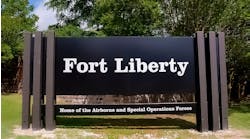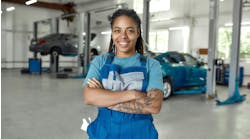In perhaps the greatest film ever made about sales, Alec Baldwin’s character in Glengarry Glen Ross reminds his staff that a customer doesn’t “walk on the lot lest he wants to buy.”
Of course, things aren’t so simple in collision repair.
Nothing is guaranteed when a customer comes in for an estimate. But there are plenty of things a shop can and should do to ensure they are capturing all the business they can. FenderBender spoke with Kyle Bradshaw, director of fixed operations for K&M Collision in Hickory, North Carolina, for some of those best practices.
The Backstory
The traditional collision repair process starting with an estimate can be a significant hindrance to securing business. At K&M Collision, Bradshaw believes an estimate is a “gross misrepresentation” of what a vehicle’s repair process is going to look like. And it’s a problem that is only getting worse as cars become more advanced and laden with technology.
“To accurately repair the vehicle, you’re having to pull a ton of OEM information, and it’s just very time-consuming and burdensome to even try to put something that’s remotely close together,” Bradshaw says.
The Problem
The level of information shops need to have at their disposal is ample. It can take hours of research, making it impractical, if not impossible, to do accurately upon a first interaction.
“There’s no way that you can do that on the front end and have a good customer experience at that point in time,” says Bradshaw.
Many — if not most — customers in need of collision repair are doing so for the first time. Handing them an estimate out of context has the potential to set their expectations in a completely different direction. There is a balance of being upfront with a customer but also not intimidating them with some of the unknowns that happen in the repair process.
“We find that it basically leads people down a much clearer path if you just go ahead and explain the process on the front end,” Bradshaw says.
The Solution
Bradshaw views K&M estimators as being in sales positions. They’re the ones who can articulately explain the repair process while also demonstrating the shop’s strengths relative to the customer’s vehicle. In K&M’s case, this means reiterating the shop uses 100% OEM parts. And it means assuring the customer that the technicians who will be working on the vehicle are uniquely trained to service that particular make and model.
Selling the customer on the shop first is a crucial step in securing his or her business. A customer wants to know that, above all, the shop they choose will take care of it.
“(The customer doesn’t) operate in this space, they don’t deal with it, and they’re relying on us to be the professional,” says Bradshaw. “And so that’s what we really try to, I guess, take the bull by the horns, so to speak and direct the customer and explain the process to them. And in a perfect world, all of that happens without us ever putting anything on paper, as far as an estimate goes.”
Securing business is all about first impressions. That’s the case for the first conversations the guest has with the estimator or customer service rep, and it’s also the case for what customers think of the shop the second they drive on the lot. K&M has made a priority of cultivating a first-class experience for customers.
Visitors find a welcoming lobby and lounge. It’s an inviting place to sit down and stay, even for someone who’s recently experienced the stress of being in a collision. It all says that you and your vehicle are in safe hands.
“I think the idea behind that for us is making the customer understand that like, hey, we’re a top-tier professional operating facility,” says Bradshaw. “Just basically knowing, like, if we do the little things right, the big repairs, obviously, that’s going to take care of itself, right?”
Obviously, not every shop has the resources to make a luxurious customer lounge. But most important is just that the shop looks clean and organized, that it gives the appearance of a well-run business that is trustworthy. And the physical space is only one aspect of the experience.
K&M aims to offer “white glove” service for customers. They offer pickup and delivery to make a repair process with as much inconvenience taken out of it as possible. But it doesn’t even take anything that extensive to make an impact. Making sure customers are greeted promptly, get all their questions answered, receive all the information they need, and know where to go if they need anything else goes a long way in a first impression.
“I think anything you can do aesthetically, like at the end of the day, that’s what people see,” Bradshaw says. “As soon as they walk through your door, already within like two seconds they’ve made up their mind like, ‘Oh, OK, this is nice, I feel comfortable here.’ Versus, you walk in and it takes 10 minutes for somebody to greet you, like what experience are you giving that customer at that point in time? And that’s what we’re really, really, really focused in on.”
Lastly, shops should do what they can to remove barriers to customers coming in. Any operator knows the limitations of online and photo estimates, and K&M doesn’t rely on them to have any indicia of accuracy, but they can be a useful tool to start the process. K&M’s market covers a large area, and customers may be hesitant to make a several-hour drive or may feel unsafe in driving their damaged vehicle.
“What we’re really using the mobile estimating tool for is just to kind of get a gauge on the damage of the vehicle, getting everything captured in our system,” says Bradshaw. “And then also, obviously, reaching out and having that sales conversation, if you will, with the customer at that point in time.”
The Aftermath
Of course, just getting the customer to hand over the keys does not mean the job is done. K&M will follow up with customers within 24 hours of their visit, helping them set an appointment if they haven’t yet, helping arrange their rental — another service K&M offers is its own rental fleet — or anything they need to keep the process moving.
These processes have been successful for Bradshaw and his shop. They track their job closing rate through CCC, and shoot for 80% minimum, though Bradshaw considers success to be closer to 90-95%. There are some potential jobs that a shop simply can’t capture for whatever reason, which drags the overall closing ratio down, but by following these customer-first initiatives, shops can close a very high portion of jobs.
The Takeaway
Securing work is all about controlling what you can control. There are always going to be factors out of a shop’s control that influence whether they earn a certain job or not, but having great processes in place will help ensure that the jobs you can get you will get. That means being open and honest with the customer, placing staff in roles where they can be most efficient, and tracking progress.
Bradshaw says that many shops are focused on taking any work that comes in no matter what. And while jobs are what keep money coming in, it’s important to keep in mind if some jobs are worth taking. Maybe it’s not a job your shop is certified for. Maybe there’s a clash with the customer. Remember what your shop’s values are and what is best for the business.
“We want every customer to have a great experience, and then also to feel like they got an upper echelon repair, if you will,” says Bradshaw. “And so for us there is going to be some stuff that comes through our door that we just don’t want, and I think that’s OK.”








